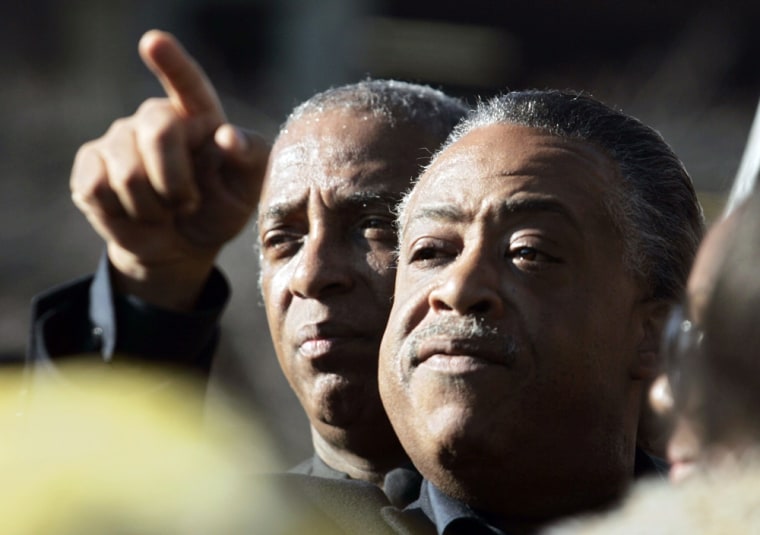The morning 23-year-old Sean Bell was shot to death by police, his grieving relatives did something that has become almost routine in such cases: They called the Rev. Al Sharpton. Within hours, the longtime civil rights activist had consoled relatives, held two news conferences, and begun organizing a community rally for the next day.
Sharpton has long been a fixture on New York's left-wing scene, and has been especially vocal in his crusade against police brutality since the 1990s. But the Saturday shooting, which left Bell dead on his wedding day and wounded two other black men, is proving again how far Sharpton has come since the days he was routinely derided as a race-baiting, publicity-hungry opportunist.
His rhetoric this week has been decidedly less harsh than in previous episodes, and he has been given unprecedented access to City Hall thanks to a mayor who is intent on not making the same mistakes of past administrations in dealing with racially divisive situations.
All the while, he keeps asking a question that many — including Mayor Michael Bloomberg — are asking: "Why did officers fire 50 rounds at three unarmed men?"
Former detractors impressed
At least one of his former detractors has been impressed with the way Sharpton has handled the situation.
"His rhetoric is totally acceptable in my judgment," said former Mayor Ed Koch, who once called Sharpton "Al Charlatan" and has had him arrested. "I haven't read a single statement on his part that is demagogic. I think he's conducted himself in a statesman-like manner."
Born in Brooklyn in 1954, Alfred Sharpton Jr. was preaching by the time he was a preschooler and was ordained a Pentecostal minister by age 9. His father deserted the family after impregnating and later marrying his stepdaughter. Sharpton and the rest of his immediate family fell into poverty. But activism kept him focused while other children got into crime and drugs.
National prominence
In the 1980s, he earned national prominence after ugly racial episodes in Howard Beach and Bensonhurst involving white gangs attacking and killing black males. Sharpton toured the press circuit, led large demonstrations and, in the Howard Beach case, helped force the appointment of a special prosecutor.
Over the years, Sharpton, who used to don velvet jumpsuits and gold medallions, has been accused of financial irregularities and blamed for inciting racial unrest. In what was perhaps his biggest blunder, he wrongly accused a prosecutor of rape in the 1980s case of Tawana Brawley, a teen whose claims of kidnapping and abuse were determined to be a hoax by authorities. The prosecutor later won a $65,000 defamation judgment against Sharpton.
In 1991, while leading a demonstration, Sharpton was stabbed in the chest by a white man. He said the incident moved him to be more careful with his rhetoric. His appeal has broadened since, enough for him to run for president, but he has remained unequivocal in demanding proper justice for minority communities.
Sharpton led protests against police after the 1997 torture of Haitian immigrant Abner Louima and the 1999 fatal shooting of African immigrant Amadou Diallo. On Saturday, after meeting with Bell's distraught relatives, Sharpton again demanded answers from the police over the shooting, carried out by five officers who were white, Hispanic and black.
He insisted, however, "We're not anti-police ... we're anti-police brutality." And at the Sunday rally, he framed the shooting as part of a larger struggle, declaring, "We've got to understand that all of us were in that car."
Once elected officials avoided him. But on Monday, Sharpton was among key figures who joined Bloomberg at news conference to address the shootings.
